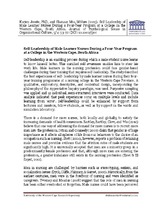| dc.contributor.author | Jooste, Karien | |
| dc.contributor.author | Arunachallam, Sathasivan | |
| dc.contributor.author | Julie, Hester | |
| dc.contributor.author | Essa, Ilhaam | |
| dc.contributor.author | Willemse, Juliana | |
| dc.contributor.author | Rashe, Hazel Vuyiswa | |
| dc.contributor.author | Ahanonu, Ezihe L. | |
| dc.contributor.author | Bimray, Portia B. | |
| dc.contributor.author | Hoffman, Jeffrey C. | |
| dc.date.accessioned | 2016-09-19T14:15:54Z | |
| dc.date.available | 2016-09-19T14:15:54Z | |
| dc.date.issued | 2015 | |
| dc.identifier.citation | Jooste K. et al. (2015). The meaning of self-leadership for nursing academics in the context of a leadership programme at a higher education institution in South Africa. Africa Journal of Nursing and Midwifery, 18(1): 1-14 | en_US |
| dc.identifier.issn | 1682 5055 | |
| dc.identifier.uri | http://hdl.handle.net/10566/2417 | |
| dc.description.abstract | A self-leadership development programme was created in 2012 for ten nursing academics with the aim of empowering them to embark upon research projects, write for subject matter publications, and develop as leaders at a school of nursing in the Western Cape. This study aimed at exploring and describing the experiences of nurse leaders with regard to the meaning of self-leadership during a leadership development programme offered by a lead researcher at a school of nursing. A qualitative, exploratory, narrative, and contextual study was conducted with a sample of eight participants who were lecturers in an undergraduate nursing programme. The researcher collected the data by means of individual narratives. An open coding method of data analysis was followed to transpose collected data into meaningful data. The participants were between the ages of 28 and 57 years. Two main themes emerged from the data analysis, namely leadership attributes and responsibilities towards the group. Nursing academics were motivated to use their self-influence to direct themselves to achieve optimum performance in the programme. Broadly speaking, the meaning attached to self-leadership was closely linked to concepts of shared leadership, reflective leadership, and collaborative leadership that were concepts leading to group leadership according to the leadership framework of Jooste (2011).
Self-leadership is regarded as an essential component of leadership and an integral aspect of the nursing academic’s role. | en_US |
| dc.language.iso | en | en_US |
| dc.publisher | Unisa Press | en_US |
| dc.rights | This is the author version of the article published in the Africa Journal of Nursing and Midwifery. | |
| dc.subject | Self-leadership | en_US |
| dc.subject | Higher education institution | en_US |
| dc.subject | Higher education | en_US |
| dc.subject | Nursing education | en_US |
| dc.subject | Research | en_US |
| dc.title | The meaning of self-leadership for nursing academics in the context of a leadership programme at a higher education institution in South Africa | en_US |
| dc.type | Article | en_US |
| dc.privacy.showsubmitter | false | |
| dc.status.ispeerreviewed | true | |
| dc.description.accreditation | DHET | en_US |

